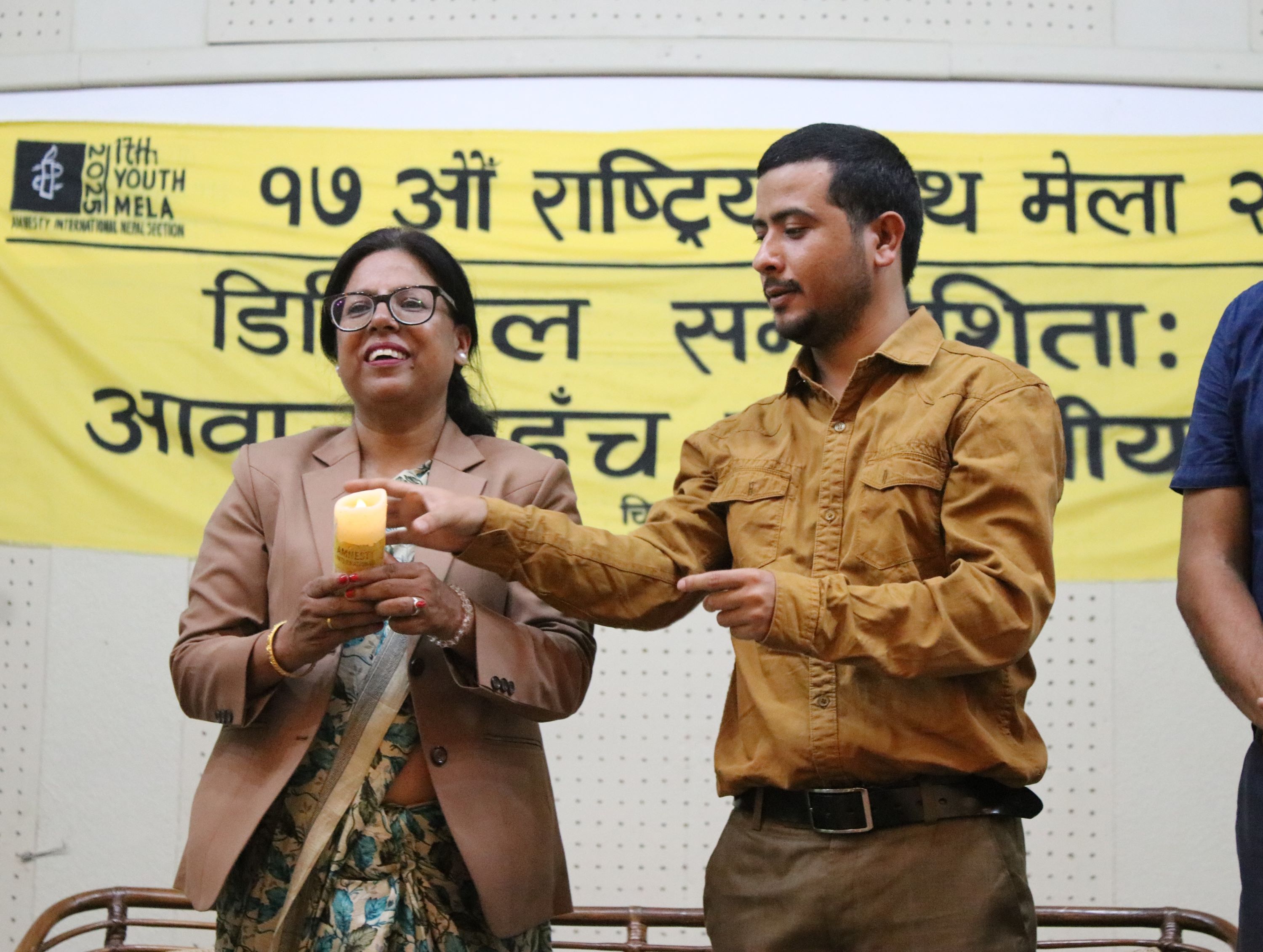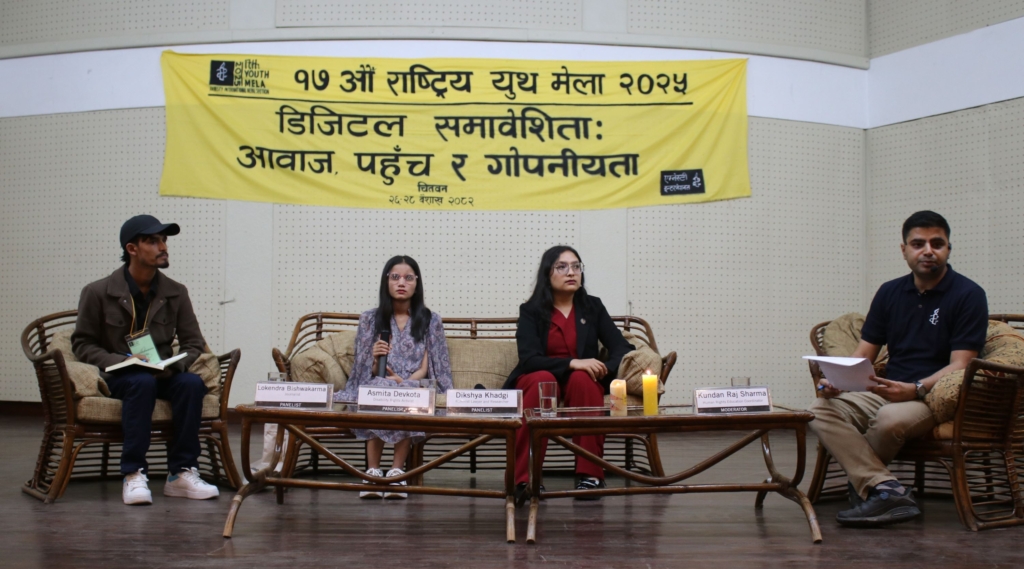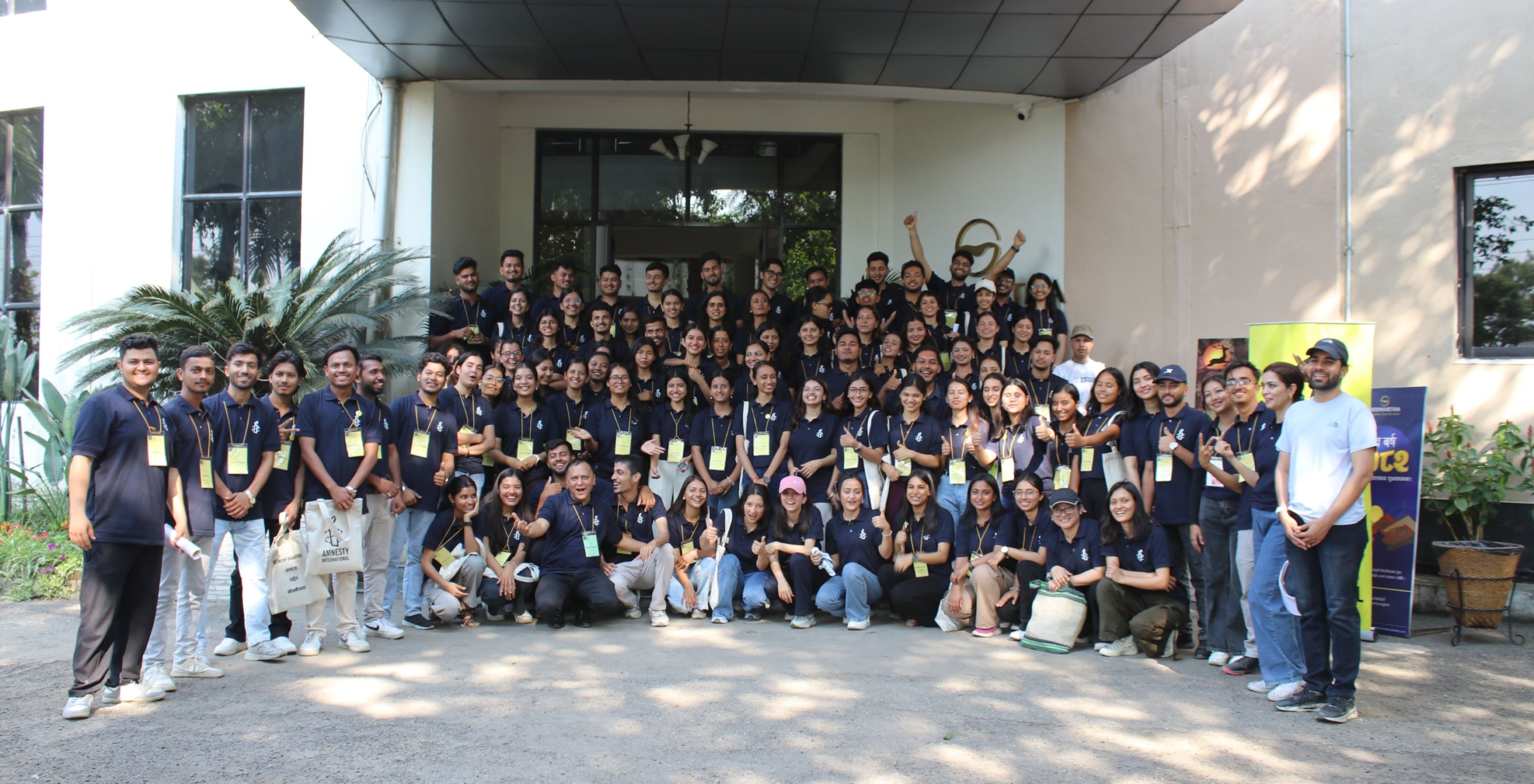Amnesty International Nepal (AI Nepal) successfully concluded its 17th annual Youth Mela—a flagship three-day national gathering of young human rights defenders—from 9 to 11 May 2025 (26–28 Baisakh 2082) in Bharatpur, Chitwan. Bringing together over 100 members from AI Nepal’s Youth Networks, Groups and individual membership across the country, the event served as a vibrant space for learning, reflection, solidarity, and creative action on urgent human rights issues.
Held annually, the Youth Mela is a cornerstone of AI Nepal’s youth engagement efforts. It introduces participants to the fundamentals of human rights, highlights Amnesty’s global and national campaigns, and builds leadership and advocacy skills through a range of interactive sessions. This year’s Mela centred on the theme of digital inclusion, offering immersive learning experiences designed to meet the evolving challenges of human rights activism in the digital age.
The program commenced with the symbolic lighting of Amnesty’s candles—a tradition that embodies hope and the enduring fight for justice. Welcome remarks were delivered by AI Nepal Director Nirajan Thapaliya, followed by a note from Dinesh Khadka of Rampur Youth Network, one of AI Nepal’s most vibrant local networks based in Chitwan. A nostalgic video montage tracing 16 years of Youth Melas was screened, followed by a presentation by AI Nepal’s IT Manager Prashant Tripathi on the spread of youth network membership across Nepal.

Top-performing youth networks were also recognised. Rampur Youth Network received a token of appreciation for having the highest number of active members. Forestry Youth Network was applauded for conducting an extensive human rights education campaign that reached over 1,100 students in Hetauda. Fusion Youth Network was celebrated for collecting over 5,000 petition signatures for Amnesty’s global “Write for Rights” campaign.
A compelling panel discussion titled “Digital Inclusion: Ensuring Voice, Accessibility, and Privacy” was one of the highlights of the first day. Moderated by AI Nepal’s Human Rights Education Coordinator Kundan Raj Sharma, the panel featured voices working at the intersection of rights, technology, and inclusion. Disability rights advocate Asmita Devkota spoke about the systemic digital exclusion faced by persons with disabilities in Nepal, citing inaccessible government websites and the lack of screen-reader-friendly educational tools. Investigative journalist Lokendra Bishwokarma explored how caste discrimination manifests in digital spaces, highlighting issues such as online hate speech, algorithmic bias, and the lack of representation of marginalised voices in tech narratives. Feminist lawyer Dikshya Khadgi addressed the gendered dimensions of digital rights, including online gender-based violence, surveillance targeting women and queer activists, language barriers, and the general lack of safety in digital spaces.
Together, the panelists offered a nuanced understanding of the digital divide—framing it not merely as a technological gap, but as a human rights issue shaped by entrenched social inequalities. Their insights challenged participants to envision a digital future rooted in equity, safety, and dignity for all.

Special guests including Charan Prasai, former AI Nepal Chairperson; Bipul Pokharel, journalist and former Chair of the Federation of Nepali Journalists; and Hon. Pratima Gautam, Member of Parliament, also addressed the gathering. Prasai reflected on Amnesty’s journey and the vital role of youth in shaping it. Pokharel spoke about rising threats to press freedom and shrinking civic space in Nepal. Gautam expressed admiration for the energy and commitment of the next generation of human rights defenders.
AI Nepal National Board Treasurer Hom Bahadur Adhikari and members Baikuntha Prasad Aryal, Mausam Karki and Lokendra Singh were also in attendance. Sanjog Pokharel from the Appeals Committee was also part of the event.
The second day focused on in-depth learnings and skill-building. The day began with a foundational session on the basics of human rights led by Director Nirajan Thapaliya, covering the origins, core values, and key duty bearers in the human rights ecosystem, including the state, civil society, media, and international bodies.
This was followed by a group discussion titled “Unlocking Amnesty International” facilitated by Campaigns Coordinator Ashmita Sapkota, HRE Coordinator Kundan Raj Sharma, and Media and Communications Coordinator Marissa Taylor. The session traced the organisation’s history, major wins and challenges, and strategies for effective human rights advocacy.

A deep dive into human rights campaigning came next, facilitated by Ashmita Sapkota and Babu Ram Pant, Deputy Regional Director for Campaigns at Amnesty International’s South Asia Regional Office. Participants learned about high-impact campaigns across the region—including Nepal’s involvement in Write for Rights—and explored strategies for local adaptation and mobilisation.
AI Nepal Chairperson Bipin Budhathoki led a session on youth leadership within the movement, encouraging participants to take ownership and responsibility in shaping Nepal’s human rights future.

This was followed by a session by Santosh Sigdel, Director of Digital Rights Nepal, on the intersection of digital and human rights. He offered practical insights on online privacy, digital safety, and freedom of expression.
Activist Praneta from Brihat Nagarik Andolan then shared her personal journey in activism, underscoring the power of youth in democratic movements. The day ended with a group session, where participants designed mock campaign strategies on issues such as torture, labor rights, digital violence, forced eviction, and the death penalty.
The final day opened with a public solidarity action in support of the people of Gaza. Participants took to the streets of Chitwan in a peaceful rally, calling for an end to ongoing violence and the upholding of international humanitarian and human rights standards in conflict zones.

This was followed by an emotional session with activist Swastika Mali, whose father, Nandagopal Mali—a traditional artisan—was forcibly disappeared during Nepal’s internal armed conflict in 2005 (2062 BS). Her testimony powerfully reminded attendees of the long-lasting trauma and injustice experienced by families of the disappeared, and the urgent need for truth, justice, and reparations.
A session on the role of media and education in the human rights movement was co-facilitated by Marissa Leena Taylor and Kundan Raj Sharma. The session emphasised the importance of strategic communication and youth-led education in keeping human rights alive in public discourse.
A participatory workshop on SOGIESC (Sexual Orientation, Gender Identity and Expression, and Sex Characteristics) was facilitated by activist Rukshana Kapali, who challenged stereotypes, addressed discrimination, and provided strategies for allyship and inclusion of LGBTQI+ individuals.

Participants also engaged in a structured debate on the topic, “Has social media done more harm than good?” under the guidance of Nirajan Thapaliya. They presented well-researched arguments on both sides of the issue.
The event concluded with a reflection and evaluation session, a certification ceremony, and closing remarks by Chairperson Bipin Budhathoki, followed by a festive social evening.
The 17th Youth Mela reaffirmed Amnesty International Nepal’s commitment to empowering the next generation of changemakers. Through critical conversations, hands-on learning, and vibrant activism, the event strengthened the youth human rights movement in Nepal—laying the groundwork for future action rooted in dignity, equity, and justice.


